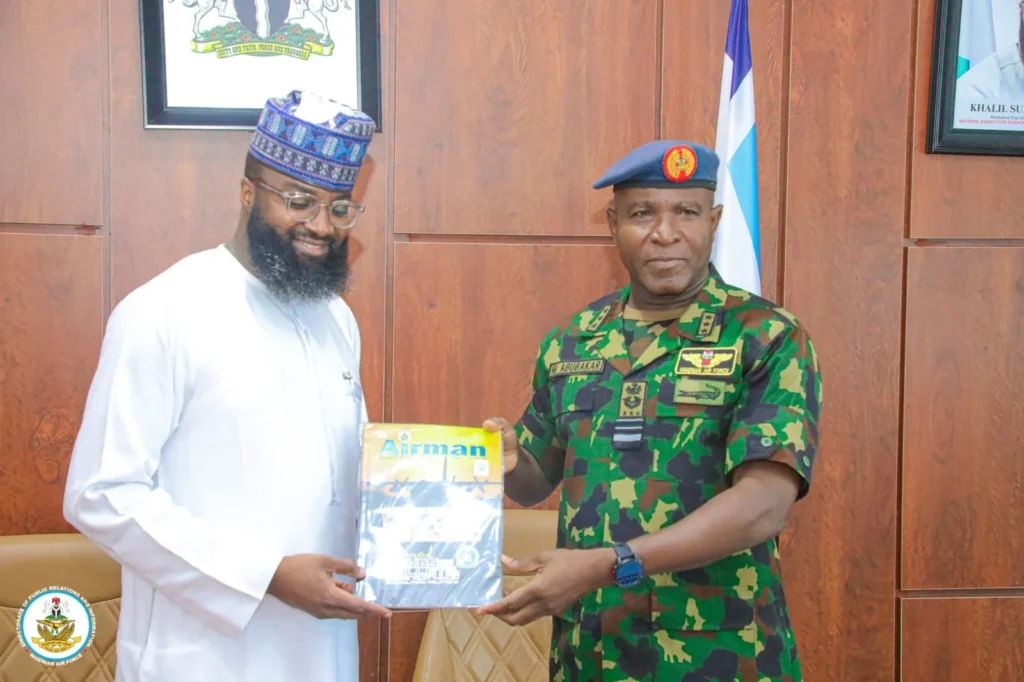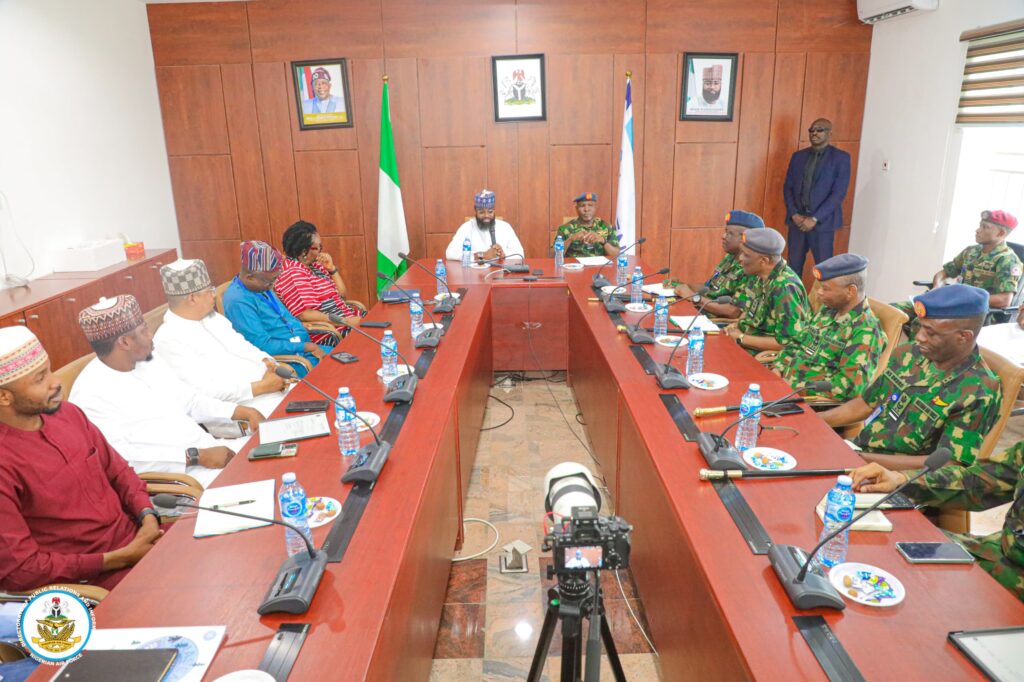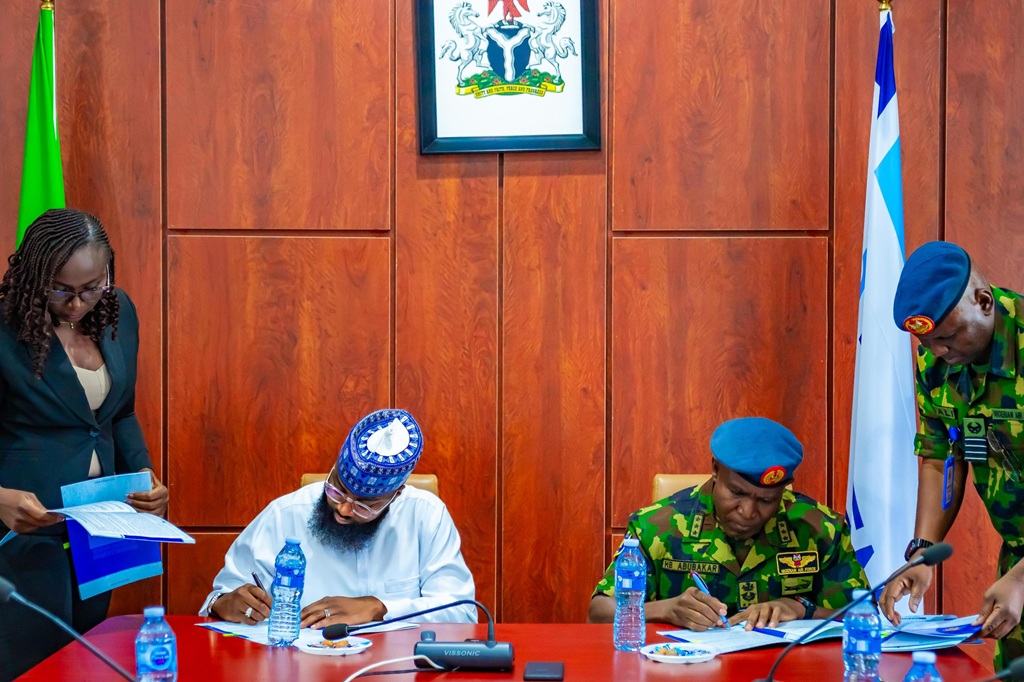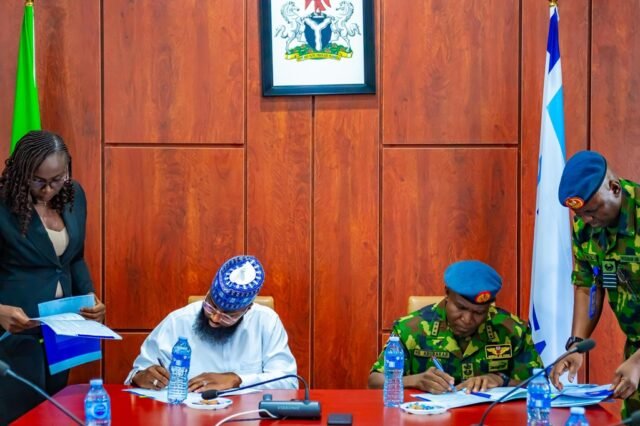In a spirited display of engineering ambition and national purpose, the Nigerian Air Force (NAF) and the National Agency for Science and Engineering Infrastructure (NASENI) have formally renewed and elevated their joint collaboration. At the heart of this move is a Memorandum of Understanding (MoU) that reaffirms the shared commitment to building Nigeria’s indigenous defence and aerospace capacity.
Table of Contents

A Turning Point at NASENI Headquarters
Under the full morning sun at NASENI’s Idu Industrial Layout headquarters, Air Marshal Hasan Bala Abubakar, Chief of the Air Staff, led a high-powered delegation from the Nigerian Air Force to renew ties with NASENI. They were warmly received by Executive Vice‑Chairman/CEO Khalil Suleiman Halilu and his leadership team—an encounter that transformed the ceremony into a forward‑looking convergence of vision and technical purpose.
This ceremony marks a deeper phase in the ongoing NASENI‑NAF collaboration—one rooted in developing local capacity and grounded in shared goals.
From Partnership to Co‑Ownership: The C‑5 Rocket and Innovation Hub
One of the most visible fruits of their technical synergy is the Nigerian‑built C‑5 Rocket Project. NASENI played a vital role, particularly in structural engineering, material analysis, and prototype fabrication—tasks once dependent on foreign expertise. Air Marshal Abubakar commended these achievements and invited NASENI to consider co‑ownership of the rocket project, thus deepening institutional alignment across development and governance.
Another key breakthrough is the creation of the NASENI North‑West Technology Innovation Hub at the Air Force Institute of Technology (AFIT) in Kaduna. Operating on land provided by the Air Force, this facility now anchors collaborative research and technological development in aerospace innovation.

Structured, Results‑Driven Cooperation Under a Renewed MoU
The fresh MoU goes beyond symbolic solidarity. It introduces refined governance protocols designed for structured, seamless, result‑driven collaboration, covering:
- Joint research and development in aerospace and defence technologies
- Local manufacturing of aerospace components and dual-use innovations
- Human capital development, including training modules and skills transfer
- Knowledge exchange and technical interchange between both institutions
Air Marshal Abubakar emphasised that the arrangement aligns with President Bola Ahmed Tinubu’s Renewed Hope Agenda, which prioritises innovation, defence self‑reliance, and capacity building for national resilience.
A Shared Vision From Importation to Creation
Mr. Khalil Suleiman Halilu reaffirmed NASENI’s enthusiasm, describing the relationship as personal and deeply collaborative. “We are not just ready—we are prepared to co‑develop technologies that will support NAF’s operations and industrial capacity,” he said. “Together we move Nigeria from importation to innovation, and from consumption to creation.”
Under his leadership, NASENI has extended its footprint beyond defence rockets, delving into Unmanned Aerial Vehicles (UAVs), drone pilot training, asset recovery initiatives, and establishing CNC machining infrastructure that rivals global benchmarks. All of these resources now stand ready for optimal utilisation through the NAF partnership.
Capacity Building: CNC Skills, R&D Training, and Beyond
Rather than being passive beneficiaries, the Air Force is moving into a more active role: joining the governance of the innovation hub, contributing to project execution, and enrolling young NASENI researchers into its new R&D training modules. A special emphasis is being placed on CNC machining skill development through NASENI’s Centre of Excellence—a capability pivotal to in-country defence manufacturing.
A Multi‑Sector Ecosystem Rooted in Inclusivity
The agreement also underscores NASENI’s inclusive approach to innovation. According to Halilu, while private‑sector partnerships drive efficiency and market dynamics, strategic collaboration with public institutions like the Air Force ensures that national priorities are fully integrated. Such an ecosystem promotes cost‑effective, impact‑oriented innovation pipelines anchored in both efficiency and mission alignment.
Significance and Strategic Impact
- Strengthened defence sovereignty: Local production reduces vulnerabilities tied to foreign supply chains in critical defence platforms.
- Industrial-backed innovation: Embedding R&D and manufacturing capacity within national scientific agencies supports technological self‑reliance.
- Human capital development: Structured training and technical exchanges nurture a new generation of aerospace and defence engineers.
- Public-private synergy: Both agencies benefit from market discipline and policy alignment, all within a national development mandate.
Context: NAF’s Push for Homegrown Solutions
According to the NAF’s own research and development exhibition held earlier in 2025, the Air Force reaffirmed its strategic direction: prioritising locally driven technology solutions to meet evolving security needs. This includes adopting unmanned systems, CNC fabrication, and prototype weaponisation tools, many developed in partnership with other institutions.
In that same exhibition, Air Marshal Abubakar stressed Nigeria’s need to innovate at home. The NAF deployed eight CNC machines at its R&D institute in Oshogbo and projected full operational use of six new UAVs later in the year. These efforts highlight the Air Force’s rising technical ambitions.
What Lies Ahead? A Roadmap for Activation
With this MoU now formalised, both institutions are poised to act swiftly:
- Operationalising the C‑5 Rocket Project: Finalise design, ramp up local manufacturing, and activate co-ownership governance structures.
- Staff exchanges: NASENI researchers to participate in NAF’s R&D training; Air Force technical staff to engage with NASENI’s CNC centre.
- Expanding innovation portfolio: Explore dual-use technologies—from UAV systems to auxiliary aerospace subsystems.
- Pilot new joint ventures: Enable joint commercialisation and scalability—potentially including export markets.

Conclusion
The NASENI and NAF Deepen Defence Innovation Alliance is not just a ceremonial signing—it is a turning point in Nigeria’s pursuit of technological sovereignty. It signals a move from dependency to self-sufficiency, from imitation to innovation. This partnership is forging a national defence innovation ecosystem, rooted in science, engineering, and shared purpose.
As Nigeria seeks to anchor its security ambitions in homegrown capability, this alliance stands as a blueprint: public institutions aligned in mission, focused on results, and committed to building a future where defence innovation is proudly Nigerian.
Join Our Social Media Channels:
WhatsApp: NaijaEyes
Facebook: NaijaEyes
Twitter: NaijaEyes
Instagram: NaijaEyes
TikTok: NaijaEyes
READ THE LATEST EDUCATION NEWS








































